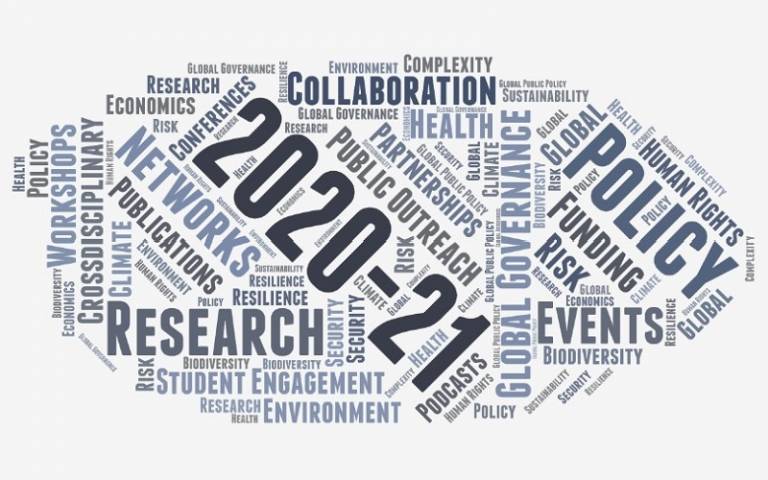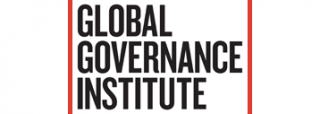GGI Annual Report 2020-21
24 August 2021
In 2020-21, despite the disruptions caused by Covid-19, the GGI has deepened and expanded its networks and partnerships, advanced its cross-disciplinary research agenda, and boosted public engagement activities.

2020-21 has been a steep learning curve. While the focus has rightly centred on containing the Covid-19 pandemic and the effective rollout of the vaccine programme, attention is now turning to lessons to be learnt for responding to future emerging global threats. We know national state capacity is of critical importance, but there is also a role for global strategy in health governance, particularly when it comes to ensuring protection of vulnerable groups. This important point has become acute as the complex second and third order effects of the pandemic response roam into view, from food supply break downs to rising energy costs and unemployment. The shock of Covid-19 has exposed global systemic fragilities across multiple systems – health, environment, technological, political and economic – which will require robust global coordination if a recovery from the pandemic is to effectively tackle the looming climate and nature emergencies.
As Dave Snowden (Cognitive Edge) remarked at a recent GGI keynote panel, responding to this imperative as a matter of urgency is likely not about designing perfect systems, but rather starting from where people are. Global governance in some form may be essential to managing irreducibly transboundary challenges, such as a global pandemic. However, as Snowden argues, it is vital that scholars and policymakers do not let the perfect “predetermined future state” be the enemy of “managing the present to actually create a new direction of travel” along positive evolutionary pathways. Exploring the upside of risks and uncertainties is now vital.
Despite the challenges posed by the past year, the UCL Global Governance Institute (GGI) has continued to undertake its core mission to provide in-depth, cross-disciplinary and cross-thematic research to better understand the global challenges we face and possible responses. What lessons do we take from the response to Covid-19 for understanding our existing ability to respond adequately to transboundary non-linear challenges? Are states maladaptive when it comes to effectively dealing with global problems? What would a resilient global governance system look like? How can we, as a community of scholars and educators, best prepare young people for the challenges ahead?
The Institute has also redoubled its efforts to make innovative use of digital tools and social media to contribute to informed public debate. To this end, it hosted a full roster of public virtual events and welcomed a truly international audience through the wonders of the Zoom webinar platform. We have been delighted to be joined by many prominent scholars, policy experts and public figures, including (but not limited to) Professor Katherine Hayhoe, Professor Miles Kahler, Professor Ahmet T. Kuru, Professor Jacqueline McGlade, Professor Aseem Prakash, and Professor Alexander Stubb. We were also delighted to collaborate with Lesley Rankin and Laurie Laybourn-Langton at the Institute for Public Policy Research and Dave Snowden at Cognitive Edge on our new research agenda probing what complexity means for global governance.
GGI team members have been frequent contributors to topical news podcasts both within and outside UCL. The Institute also launched its own podcast, co-hosted by students (now alumni) of the Masters programme in Global Governance and Ethics. The podcast, called Imperfect Utopias or Bust? Global Governance Futures, has aired 14 episodes since its launch in October 2020 and it has proven popular, especially on our YouTube platform. In addition, GGI team members have contributed opinion pieces to The Conversation, the World Economic Forum and other venues on topical issues, from the COP26 climate summit to the future risks posed by deadly pandemics, and the importance of tackling social inequalities if net-zero carbon emissions is to be achieved.
The GGI continues to collaborate with UCL-based, national and international partners in research, policy and practice. In 2020-21, the GGI team worked with colleagues across Europe and beyond to advance two research projects on climate change governance and global governance effectiveness, as part of an EU Horizon 2020 research consortium focused on identifying future scenarios for global governance. The GGI has also become an active member of the COP26 Universities Network which brings together more than 45 UK-based universities to help deliver ambitious outcomes at the upcoming UN Climate Summit in Glasgow. As part of this initiative, GGI Deputy Director Tom Pegram led a group of academic experts in producing a briefing paper on pathways to socially inclusive decarbonisation.
Throughout the year, the GGI Thematic Directors – Dr Zeynep Bulutgil and Dr Manuel Vogt (global security), Professor Barnali Choudhury (global justice and ethics), and Dr Julius Mugwagwa (global health) – have engaged our community of faculty, students, civil society, policymakers and the general public through events, workshops and publications on a wide range of topics, from global health governance in a time of Covid-19 to vaccine readiness in developing countries, the determinants of civil war and the systemic risks posed by climate change, among others.
This year, the GGI has received generous grants from UCL Grand Challenges, the UCL Environment Domain and the UCL Global Engagement Office which have facilitated major activities on a shared agenda for the UN Sustainable Development Goals on biodiversity and climate change, as well as on complex risk governance for a green and sustainable recovery from Covid-19. Funding has allowed for ongoing and new collaboration with colleagues across ten UCL departments and institutes (Anthropocene, Bartlett DPU, BSEER, CBER, Energy Institute, IRDR, ISR, Political Sciences, STEaPP and WRC), leading international experts, including Professor Sir Bob Watson (former chair of IPBES and IPCC) and Professor Natalie Seddon (University of Oxford), as well as prominent voices in national policy conversations, such as Lord Toby Harris (Chair of the UK National Preparedness Commission).
With support from UCL Grand Challenges and the UCL Global Engagement Office, the GGI was also able to provide awards for a university-wide student essay competition on the climate and biodiversity crisis. Our winner was Jeremy Ogilvie-Harris (UCL Laws) for his excellent essay on The Importance of Public Participation in Environmental Decision Making: The UK Environment Bill. Honourable mentions also go to our runners-up Kata Moravecz, Daniel Richardson, and Jingwen Zhang. We are extremely grateful to the support we continue to receive from students across UCL who regularly support our activities by writing commentaries, providing research for policy briefs, and conducting interviews.
As we move into 2021-22, the GGI will continue to work to amplify UCL’s track record as a leader in research impact focused on driving forward innovation and enhancing resilience in response to global challenges. The Institute’s mission is closely aligned with the goals of UCL 2034 to identify solutions to global societal problems – such as climate change, global health, war and conflict, as well as human rights. Going forward, the GGI will build further upon the findings of the UCL Grand Challenges programme and its mechanisms for bringing expertise together and integrating knowledge, as well as capitalising on existing effort and good will across the university.
 Close
Close


